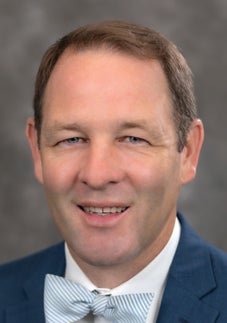PFEIFFER COLUMN: Reflections during Pentecost
Published 11:37 am Thursday, June 4, 2020
|
Getting your Trinity Audio player ready...
|
To the Pfeiffer University community — especially our students, faculty, staff, alumni, and citizens of Stanly County:

Scott Bullard
I write this evening in order to offer prayers for us as we grieve the loss of George Floyd, the pain his family must be feeling, and the fear, sadness and anger that the African-American brothers and sisters who are vital members of our community and our country are experiencing as our nation navigates a time marked by violence, division and — we hope — dialogue that leads to a greater measure of peace.
More importantly, I want to speak on behalf of many of my colleagues and acknowledge that we comprehend — in varying degrees — that the death of George Floyd is not an isolated event. Indeed, Floyd’s death — along with several events in 2020, including the video that emerged three weeks ago of the senseless shooting of Ahmaud Arbery — reminds us of hundreds of years of mistreatment of, and violence towards, African-Americans in our nation.
At times, the deaths of Floyd and Arbery take my own mind back to the era of slavery or to the murders of Martin Luther King Jr. and Jimmie Lee Jackson in the 1960s as they fought for greater freedoms in the Jim Crow South.
In other moments, these deaths prompt me to ponder the undeniable, continuing oppression that manifests itself in our world today in a variety of ways: through horrific events that “go viral” on the internet because they were caught on camera, but also through events that many of us never learn about or ponder — and we never learn about them or ponder them precisely because some of us have been born into — and continue to live in — very fortunate circumstances.
Our university is a church-related university and is, in fact, the first “historically white” four-year, private institution in North Carolina to admit an African-American student in the 1950s.
This week, Pfeiffer’s founding denomination, the United Methodist Church — along with the majority of the church universal — celebrates Pentecost, the so-called “birthday of the church.”
Celebrated about 50 days after Easter, Pentecost marks the day on which the Holy Spirit descended to the members of the earliest church — a very diverse group — and caused them to speak and understand languages that had heretofore been inaccessible to them.
Within a matter of days, the book of Acts says, this same Spirit that caused them to understand one another, led them to “share all things in common,” worship together, and conceive of themselves as “one body.”Some readings of the same passage suggest, however, that on that first Pentecost, the church was confused.
Many were reeling from the recent “ascension into heaven” of Jesus, who — though he had promised a “comforter” who would “send power” to the church to be his body on earth — had, in their view, “disappeared” the week before. Certain readings would have us believe that they were even fearing for their lives, locked in a room so that government officials could not locate them to arrest them, or mock them.
Brothers and sisters, this Pentecost, we are presented with an opportunity to put away fear, to stand up, to emerge from our locked rooms, and — while we may not interpret a new language in the most literal sense — to listen in new and genuine ways to the concerns articulated by those brothers and sisters whose perspectives we sorely need, whose perspectives we have ignored or marginalized, whether consciously or unconsciously.
We have an opportunity to see with fresh eyes that all persons are made in God’s image, and we have an opportunity to learn from brothers and sisters whose lives and witness we must see and hear, lest we miss out on the fullness of the possibilities of life, lest we have a body of Christ that is less than whole.
We have an opportunity to leave the comfort of our normal existences — whether that means joining a demonstration or teaching and reading a new author in the college classroom, perhaps an author of color whose voice has been previously absent from the curriculum.
Pfeiffer has quite the legacy to undergird her as she pushes forward. Not only were we among the first in our state to admit African-American students, we were founded by a woman, Emily Prudden, who educated children regardless of their color.
Today, though we are flawed in many ways, we are propelled forward by a caring and innovative faculty and staff. If you study at Pfeiffer or teach at Pfeiffer or simply visit our campus, you have our pledge — your voice will be heard; your perspective will be taken seriously; your safety will be our highest priority. We will treat you as if you are made in the very image of God, because you are. When you fail, you will be issued a loving but firm critique. If we fail you — and we will, at times — we will expect to be offered a firm but loving critique.
As we grow and encounter new people, new circumstances, and new literature, we will miss the mark on occasion, and we will need forgiveness. But because we have driven out fear and have committed to caring for one another and speaking up for those who have been robbed of their voices, we will indeed grow, and we will be the better for it. May God find us faithful.
Dr. Scott W. Bullard is president of Pfeiffer University.




